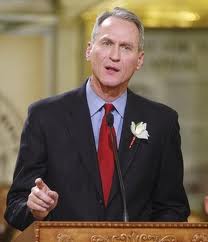As a result of a 3-part series of articles by National Public Radio (NPR) troubling Native American foster care policies and practices in the State of South Dakota are drawing national attention.
Ignoring the Law?
There are two areas of concern at issue. The first is related to South Dakota’s apparent defiance of the 1978 Indian Child Welfare Act which says that except in the rarest circumstances, Native American children (in need of relocation or foster care) must be placed with their relatives or tribes.
According to an NPR analysis of state records, the vast majority of native kids in foster care in South Dakota are in non-native homes or in group homes.
More than 700 Indian children are removed from their families each year in South Dakota and state records show, only 13 percent of these children have gone to Indian foster parents.
Native American groups charge that most children are removed because of “neglect,” a fuzzy definition that often is arrived at because of a failure of the mostly non-Indian social-service workers to understand Indian culture. “[E]ven Native American children who grow up to become foster care success stories, living happy, productive lives, say the loss of their culture and identities leaves a deep hole they spend years trying hopelessly to fill,” NPR reports.
As a result, US Congressmen Ed Markey (D-MA) and Dan Boren (D-OK) have called for an investigation by the Interior Department in a letter to Larry Echo Hawk, Assistant Secretary of the Interior Department for Indian Affairs.
Conflict of Interest?
The second area of concern arises from the fact that anecdotal evidence indicates that foster-care homes licensed to Native Americans are ignored by the state’s social services agency when placing children removed from their families. Instead it appears that the vast majority of the kids placed in group homes were placed at Children’s Home Society, the state’s largest foster care provider, in Sioux Falls, SD.
And this is where the controversy gets more personal and ominous.
Until his election as governor in 2010 and while he held the office of Lieutenant Governor of South Dakota, Dennis Daugaard was the Executive Director of Children’s Home in Sioux Falls, SD. Moreover, when contracts were issued for foster care, NPR’s investigation alleges that:
“In just about every case, the group (Children’s Home Society) did not compete for the contracts, or bid against any other organization. For almost seven years, until this year, Daugaard’s colleagues in state government just chose the organization and sent it money-more than $50 million in all.”
The success of Children’s Home Society can be attributed in great part to Dennis Daugaard and that fact was prominently mentioned in his recent successful campaign for governor. In the seven years that Daugaard has been employed by Children’s Home Society, it has added two new facilities and it has prospered financially sevenfold, while its Executive Director was also the lieutenant governor.
During the same time, at least two other group homes have shut their doors due to the lack of state contracts. Troy Hoppes, owner Canyon Hills Center told NPR that he wasn’t aware of many of the contracts until after they were given to Children’s Home. Hoppes added that at the time that his facility was struggling to fill its beds and approved by the state for contracts, that Children’s Home had a waiting list.
Governor Daugaard’s Response
In a statement, Daugaard’s office emphasized that the lieutenant governor’s job was part-time, and that Daugaard never supervised any of the people who approved the contracts.
His staff also was critical of the NPR report, saying that NPR was biased and inaccurate in its reporting. However, no specifics were offered.
Editors Commentary
To date, the governor’s response to the report presented by NPR has been wholly inadequate.
It is my hope that the governor will present facts and evidence that supports the allegation that the NPR article is biased and inaccurate. Merely calling it so does not make it so.
As a conservative, I readily accept that NPR is not a bastion of conservative thought or outlook and I believe that all good ideas do not come from Washington. But the information presented appears, on its face, to be supported by facts. Facts will be needed to refute their report and expose their bias and/or inaccuracies.
I regularly criticize the Obama Administration for their circumvention of existing law (DOMA and the War Powers Act leap to mind), so if the State of South Dakota is in defiance of the Indian Child Welfare Act it must cease that defiance. Acceptance of that fact, if true, would be the first step. If the State of South Dakota has philosophical differences with the spirit or the letter of the law, then the State should address that through whatever means available.
It is in the area of conflict of interest that I have the greatest concern. Once again, based on the NPR article, the facts appear to support conflict of interest and an insidious abuse of power and influence by the governor as well as the corrupt practice by the state of awarding no-bid contracts for state services.
At issue here is the proper treatment of Native American children according to the law, the actual performance of the State of South Dakota in compliance with the law, the accuracy and veracity of the NPR report and the role of the governor (then lieutenant governor) in these matters.
I hope that we will hear from Governor Daugaard in a very clear and substantive way very soon. Stonewalling will not be acceptable.
 ***Ed Randazzo, is a nationally syndicated author. He has been a conservative activist and consultant for over 30 years and is currently the Chief News Editor of Life and Liberty Media***
***Ed Randazzo, is a nationally syndicated author. He has been a conservative activist and consultant for over 30 years and is currently the Chief News Editor of Life and Liberty Media***




Ed, Governor Daugaard inherited this mess that has been festering for the last 20 plus years. Janklow had such a hatred for the Indian people he refused to even consider doing anything about it. Rounds continued to ignore it. Bottom line, state of South Dakota did not implement the Indian Child Welfare Act (ICWA).
But, the state took the money. Deb Bowman and Virginia Wiesler with the DSS have caused more hate and discontent concerning the DSS than anyone in its history.
I think Governor Daugaard may have made a mistake in attacking and trying to discredit NPR, when it may have been more positive to ask for a accounting of DSS and the ICWA program.
I am confident Daugaard has nothing to hide, but he also has everything to lose if he falls on his sword for Bowman and Wiesler.
When I was on appropriations (which I was never the chairman), we found so many discrepancies in the DSS testimony, that the committee could not get our arms around the actual truth.
I hope we have not heard the end of this issue.
Bill